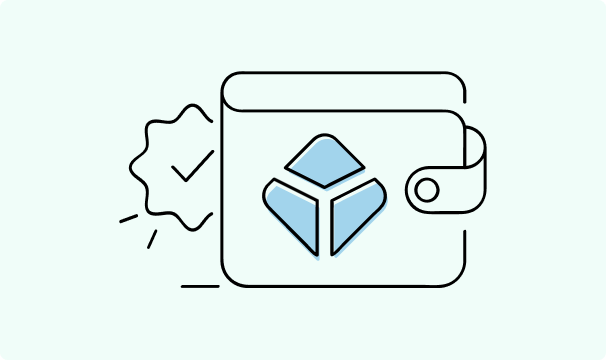Is Blockchain Wallet Safe? Risks and Security Tips
Key Takeaways:
- Blockchain wallets are safe when managed correctly and equipped with strong passwords and two-factor authentication.
- Use cold cryptocurrency wallets for long-term investments and hot crypto wallets for daily transactions.
- Never share your password or recovery phrases with anyone.
- Regularly update your wallet software and back up recovery information securely.
Blockchain wallets are widely used to manage cryptocurrency. With them, you can access your private keys and send, receive, and store your digital assets securely. However, as cyber threats keep raising more security issues, users often ask “is a blockchain wallet safe?”
In this article, you will find the answer to your question and discover the basics of blockchain wallets, look at their security features, and find tips that will help keep your crypto wallets safe.

Rasa Sosnovskytė
5 min read

What Is a Blockchain Wallet?
A blockchain wallet is a digital tool that allows you to store and manage cryptocurrency. It’s basically a cryptocurrency wallet that works similarly to an online bank account, only without a bank being involved.
Instead of holding money, it holds your private keys, which give you access to your cryptocurrency. Each blockchain wallet generates two primary keys:
- A private key. It’s like your password that allows you to spend or move your funds.
- A public key. This works like your account number that other people can use to send you some funds.
Types of Blockchain Wallets
Hot Wallets (Online)
Hot wallets are connected to the internet which makes them more convenient to access and use. On the other hand, it also makes hot wallets more vulnerable to hacker attacks.
These wallets include software wallets, mobile apps, and browser extensions. Some examples could be Zengo and Guarda.
It’s extremely important to select your blockchain wallet with caution and deeply research the provider’s online reviews, webpage, social media accounts, and more to establish trust.
Cold Wallets (Offline)
Cold wallets, like a hardware wallet, are offline and highly secure. Since they’re not connected to the internet, they are very unlikely to fall victim to online threats like hacking, phishing, and malware. Devices like Ledger and Trezor are among the most popular choices.
If you consider yourself a long-term crypto investor or are holding large amounts of digital assets, cold custodial wallets are significantly better options than hot wallets. However, the enhanced security comes with drawbacks, as cold wallets are way less convenient for frequent transactions.
If cryptocurrency is part of your daily routine, you may want to keep most of your digital assets in a cold wallet for more security and open a hot wallet with less funds for daily transactions.
Is a Blockchain Wallet Safe and Secure?
The short answer is yes – if you know how to use it correctly. Let’s see why it’s secure and how you can learn to use it safely.
How Blockchain Wallets Work
Blockchain wallets use advanced security measures to protect your crypto, such as:
- Encryption. It secures your software wallet data and helps prevent unauthorized access.
- Private/public keys. The private key ensures only you can access your funds and the public key is used as an account number for others to be able to send you funds.
- Decentralized technology. It keeps your wallet independent from central authorities, highly reducing the possibilities to track your transactions and asset movement.
Key Security Features to Look For
To keep your crypto wallets secure, consider wallets with the following security features:
- Two-factor authentication. It adds an extra layer of protection that significantly boosts your protection.
- Biometric security. Using fingerprint or facial recognition will prevent access in case your device gets stolen.
- Backup options. It helps recover your account and funds if something goes wrong.
- Reputable providers. Check online reviews, social media presence and only choose trusted names.
Potential Security Risks in Blockchain Wallets
While blockchain wallets are generally considered as secure, nothing is really invincible. Let’s see what risks you could face.
Common Threats to Wallet Safety
- Phishing attacks. Fake emails or websites may try to trick you into sharing your private keys in exchange for some unrealistically high rewards.
- Malware. Hackers could try to get you to download malicious software via intrusive pop-ups, ads, or emails.
- Weak or compromised private keys. Make sure to set up a strong private key made up of upper-case/lower-case letters, numbers, and special symbols.
Risks of Mismanagement
- Losing private keys and recovery phrases. If you lose both these things, your account and cryptocurrency may be gone forever.
- Human error in wallet setup. Some wallets may include advanced setup options, and misconfigurations could leave your wallet exposed to threats.
Tips to Ensure Your Blockchain Wallet is Safe
Choose a Reputable Blockchain Wallet Provider
Always check online reviews on platforms like Trustpilot, Google Play, Apple Store, Reddit, or other places where you usually go to get more information about something.
Make sure you choose a trusted blockchain wallet provider with a proven track record to avoid falling into scam pitfalls.
Use Strong Passwords and Two-Factor Authentication
When creating a password (private key), make sure to make it a long string of different characters – lower-case letters, upper-case letters, numbers, and special symbols. It will make your funds significantly safer from hackers than a short password including your birthday or dog’s name.
Also, set up two-factor authentication for even more protection that will boost your blockchain wallet’s security.
Use Cold Storage for Long-Term Investments
As mentioned before, cold hardware wallets are a lot safer for long-term investments and digital assets than hot wallets. If you don’t dabble with cryptocurrency on a daily basis, it’s recommended to store most of your digital assets in a hardware wallet to minimize risks.
Regular Updates and Secure Backups
Make sure that your software wallets are always updated. Outdated apps can be more vulnerable to cyber attacks which puts your funds at risk. Also, backup your private keys and recover phrases in a secure place to avoid losing your account in case you forget them.
Don’t Share Private Keys
Never share your private keys or recovery phrases with anyone. These are the most sensitive components of your blockchain wallet.
Conclusion
So, is blockchain wallet secure? Yes, it is – when you take the right steps. Modern blockchain wallets offer great security features, but it’s completely up to you to use them wisely.
If you create weak passwords and share your sensitive information with people regularly, there’s nothing that would be able to protect your funds. Follow the tips outlined above, use two-factor authentication, create strong private keys, don’t share sensitive information and you will be fine.
Remember, a blockchain wallet is only as secure as the person managing it. It’s your responsibility to keep your crypto wallets protected.
Can blockchain wallets be hacked?
Yes, but it’s rare if you follow best practices like using two-factor authentication and storing passive crypto in cold wallets.
What happens if I lose my private key?
You can get it back by using your recovery phrases. If you have lost your recovery phrases as well, you won’t be able to access your funds and they will most likely be gone permanently.
Is a blockchain wallet safer than traditional online storage?
Yes, a blockchain wallet offers better security through encryption and decentralization, unlike traditional online accounts.

Author
Rasa Sosnovskytė
Chief Executive Officer at Growth Bite
Rasa is a well-known SEO expert and co-founder of Growth Bite, a digital marketing agency. She has previously worked with globally recognized brands such as NordVPN, Oxylabs, and many others.
Related articles
4 min read
Ethernet vs Wi-Fi: Which One is Better?
Ethernet and Wi-Fi are the two main ways to connect your computer to the internet. While Wi-Fi has received significantly more attention in recent years, especially among consumers, due to its simplicity and flexibility, ethernet is still widely used in various other applications.
Even if Wi-Fi is significantly more popular, it isn’t strictly better. Both methods have their benefits and drawbacks. Wi-Fi’s popularity comes from its ease-of-use and flexibility, but an ethernet connection can be much more useful in certain scenarios.

Adomas Šulcas

5 min read
How to Change Chrome Proxy Settings: The Ultimate Guide
A proxy server is an easy alternative to a VPN that can perform most of the functions of the latter. It’s a server that stands between your device and the destination server, taking your connection requests and forwarding them in your name.
Destination servers in almost all cases see the proxy server as the originator of the request. As such, proxies are widely used in various, mostly business-related applications whenever privacy, security, location changing, and several other factors are at play.

Guoda Šulcaitė